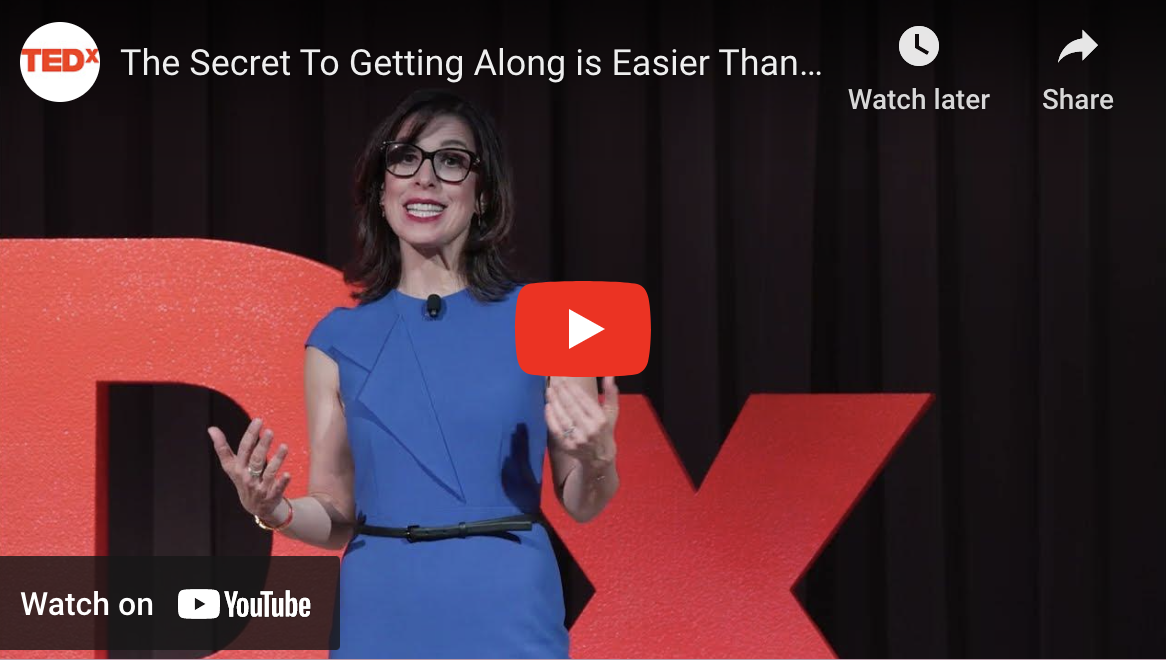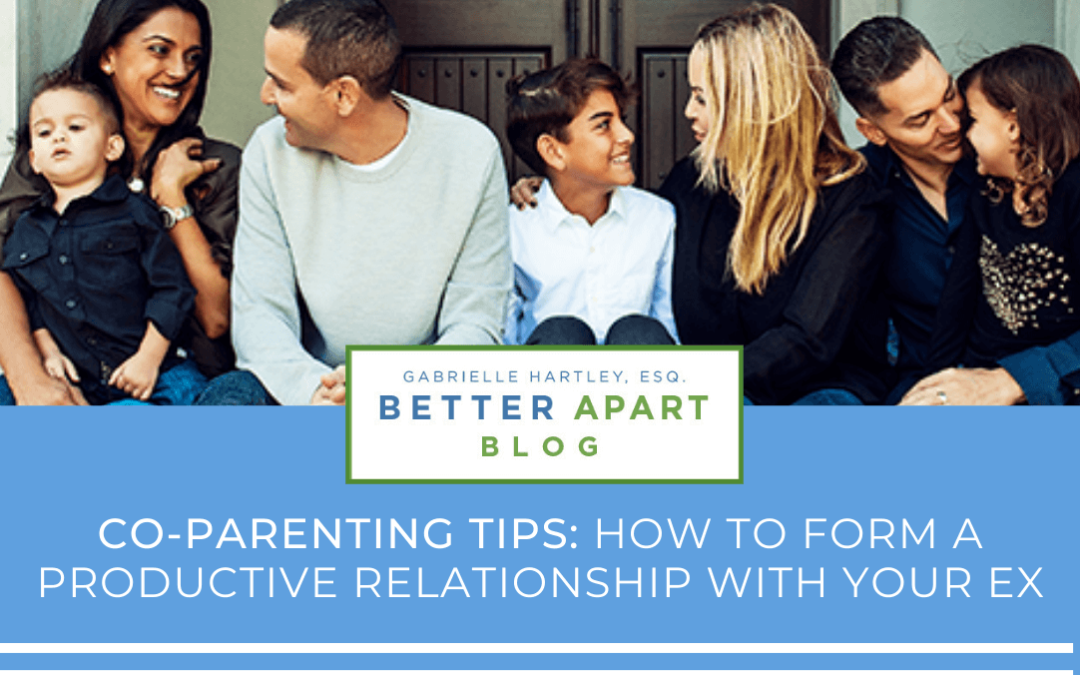With the Coronavirus outbreak, I know that many in my community are feeling the extra strain on their relationship with their co-parent. As we struggle to navigate this global pandemic, it’s important that we do our best to remain kind to ourselves and to one another, for the benefit of our families. While these co-parenting tips on forming a productive relationship with your Ex from my friends over at The Happy Divorce are relevant all year long, I believe they are an especially important reminder right now, as stress runs high and we all do our best to navigate this new normal as a blended family.
By Our Happy Divorce
You’ve ended your marriage and are interested in keeping things positive with your ex. Starting the process is always the hardest part. Luckily, the amicable divorce movement is gaining ground, and other people just like you are actively working toward mutually beneficial splits. But, what do you do if you’re having trouble bridging the gap between your hurt feelings from the end of your marriage and moving into a positive future?
Remember: a shared commitment to doing what’s best for your kids helps shield kids from the negative effects of divorce.
“I knew that nothing mattered more to Nikki and me than our son’s happiness, health, and well-being and that we’d do anything to make sure divorce didn’t hurt him” ~Ben Heldfond, Our Happy Divorce
Successful co-parenting is based on the question: what is best for the kids? If you can check your ego at the door and focus on this, a productive co-parenting relationship with your ex is possible.
5 Co-Parenting Tips For a Productive Relationship With Your Ex
Leave Your Ego at the Door
When a relationship ends, there are usually bruised egos on both sides. When it came to doing what was best for their son, Asher, co-authors, and co-parents Nikki DeBartolo and Ben Heldfond were able to check their egos at the door, which was definitely an uphill battle that took a lot of time and patience.
Ben and Nikki explain in their book, Our Happy Divorce, “We were sure that we could make it work—we just had to sacrifice every last shred of pride, ego, fear, control, and selfishness in ourselves.”
Practice Forgiveness – For Your Ex and Yourself
Leaving your ego at the door is easier when you make a commitment to forgive both yourself and your ex for your roles in the divorce. Forgiving your ex doesn’t happen overnight, but holding a grudge will only fuel your ego and get in the way of co-parenting.
It’s important to focus on empathy and patience when approaching your ex. Making this your natural response to interacting with your ex may take time, but you’ll get there. Try incorporating these co-parenting tips and practices into your interactions:
- Start talking. Whether it’s in person or a phone call, simply make the first step and reach out. Stick to the specific question or need the kids have and try to keep the emotions at bay.
- Stay positive! Assume your ex has a positive intent in what they say and do regarding your child. This assumption helps you avoid criticizing, over-analyzing, and blaming them.
- Write a letter. Sometimes it helps to get all your feelings out, even if no one hears them or reads them except for you. Be open and honest in this letter owning your part in the end of your marriage, and your ex’s.
- Embrace your freedom. Sharing custody with your co-parent means you’ll consistently have time to yourself. Find a hobby or activity that you love as a way to look forward to this time. Also, use this time to decompress and practice self-care.
- Find your tribe. Whether it’s through therapy, dinners with friends or online communities, build a strong support system.
In addition to forgiving your ex, it’s also important to look inwards. The more that we understand ourselves, our emotions and the etiology of them, the better we can be at understanding how to effectively deal with our ex. For instance, feelings of insecurity, inadequacy, guilt, shame, and fear of abandonment are often avoided. These bubble to the surface as anxiety, anger, rage, and frustration. We turn these uncomfortable feelings outward and project onto others in order to avoid facing our true vulnerability. The sooner that we can understand what triggers these deep emotions, the sooner we can start responding with our rational mind. We can be aware of what’s “our stuff” and what’s “their stuff”
This includes addressing any feelings of personal guilt you have over the divorce. This is where your support system or therapeutic letter writing can help.
“Realizing I was accountable for who I was in every way and that I still needed to examine some gaping holes in myself was a tough process.” ~ Ben Heldfon
Communicate Openly
Co-parenting requires a high level of communication with your ex. The ages and maturity levels of your kids, as well as factors like school, sports and activities, will all influence the amount of communication that’s required.
Depending on your relationship with your ex, this communication may occur face-to-face. Ben and Nikki have weekly family dinners with their blended families. This allows them to show their son, Asher, a united front.
If that feels like too much for you, there are many co-parenting apps that include messaging services, shared calendars, and financial tracking. Relying on a neutral third party, like an app, can sometimes remove the stress of communicating with each other so you can focus on the decisions at hand.
If you are used to communicating face-to-face, and unable to do that due to Coronavirus and social distancing, you could consider having a regular phone conversation or video chat over Zoom. Just because you are not able to communicate in person does not mean you cannot remain united on issues that involve your child.
Set Boundaries
One of the secrets to successful communication with your ex is setting boundaries. If the emotional conflict is still high, by keeping things business-like between the two of you, you can avoid getting entangled in unnecessary arguments. It’s okay to not respond right away when your ex reaches out about the kids, especially if you’re feeling angry or disappointed. Wait until you can focus completely on what’s best for the kids.
An easy way to set boundaries is to use your custody schedule as a guide. Instead of communicating non-stop, use that transition time when your kids move from one house to the other to touch base with your ex, address any parenting issues that came up while you had custody, and confirm certain details about the schedule ahead.
Accept Your Ex For Who They Are
Good, bad and ugly, you and your ex are still joined together as long as you are raising kids together. The sooner you can accept them for who they are, the easier co-parenting will be. Many of the same issues that contributed to your divorce will still be present as you co-parent.
Practicing empathy and forgiveness will help you overcome these frustrations. Again, if you need to, keep your focus strictly on the kids and what’s best for them. Don’t respond out of anger, jealousy, or insecurity. Focus on collaborating, not competing. All of these make co-parenting tips make your relationship easier and help avoid many of the negative effects of divorce on kids.
Co-parenting is becoming the norm in blended families, but that doesn’t make it the natural choice. Successful co-parenting takes work, and a little help from the people who’ve gone before you. There are many co-parenting blogs, podcasts, Facebook communities, books and even Pinterest boards filled with co-parenting tips to help you find the support and tips you need to be the best co-parent you can.
Divorce is tough. Sometimes all we need is a guiding light to help us find our way through the darkness. Ben and Nikki, along with their son Asher, and their spouses Nadia and Chad, are a shining example that provides hope to families who are seeking a healthy alternative. Visit the Our Happy Divorce website to learn more.
P.S. Want more tools and resources to stay positive during a divorce? Download my Free Divorce Survive & Thrive Kit below!
With support and strength,


FOLLOW GABRIELLE

DISCLAIMER: The commentary, advice, and opinions from Gabrielle Hartley are for informational purposes only and not for the purpose of providing legal advice or mental health services. You should contact an attorney and/or mental health professional in your state to obtain advice with respect to any particular issue or problem.
- One Edgewater Plaza Suite 304, Staten Island, NY 10305
- 266 Smith Street, Brooklyn, NY 11231
Northampton MA
PHONE:
New York: (917) 905-4553
Boston: (413) 450-0420


